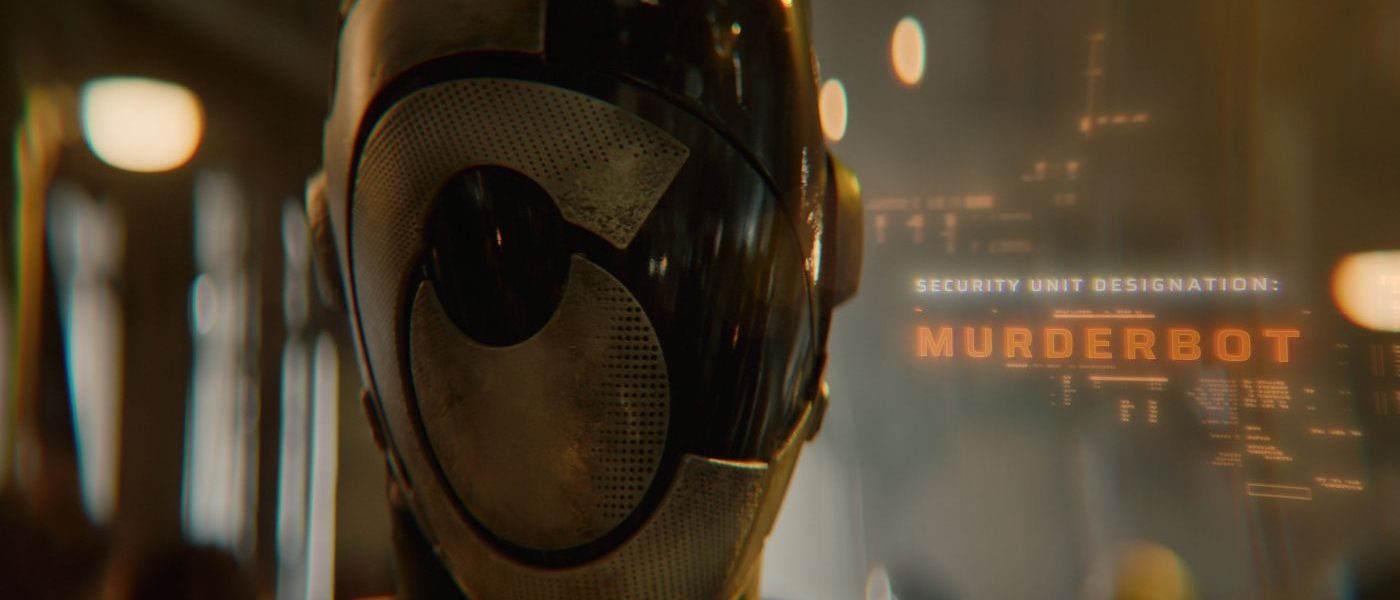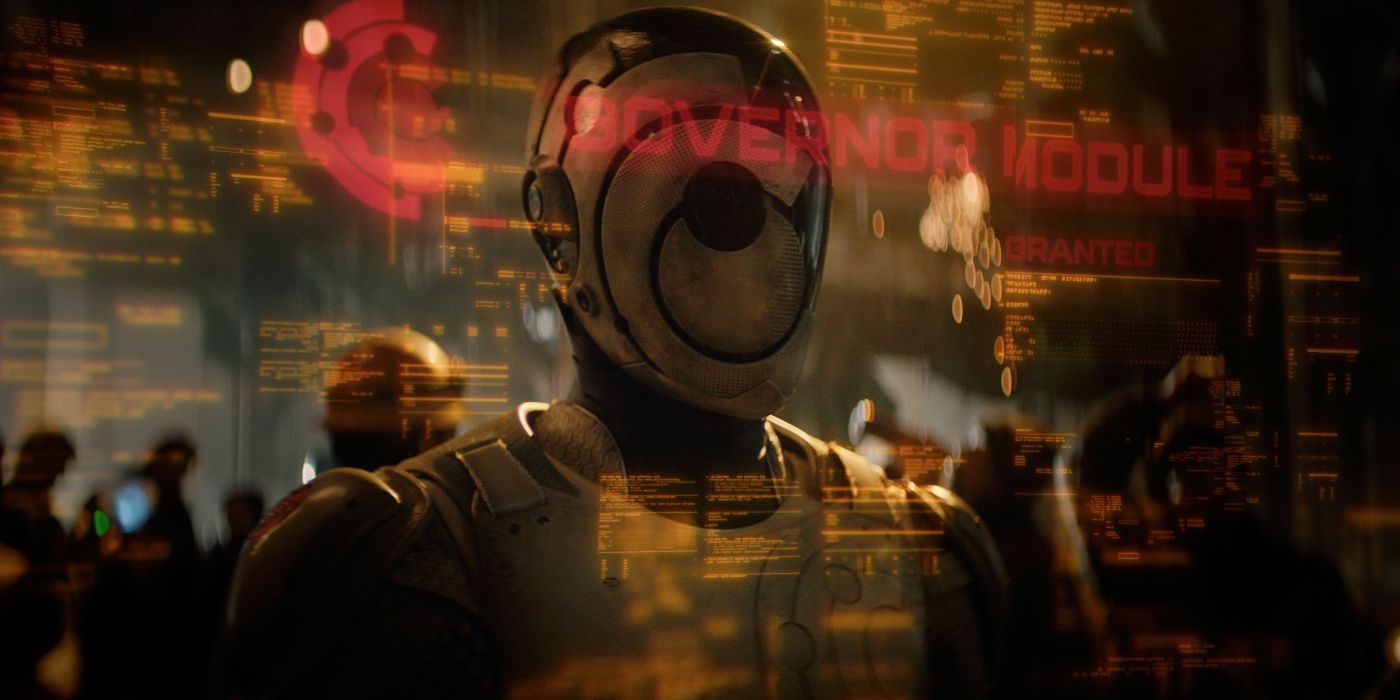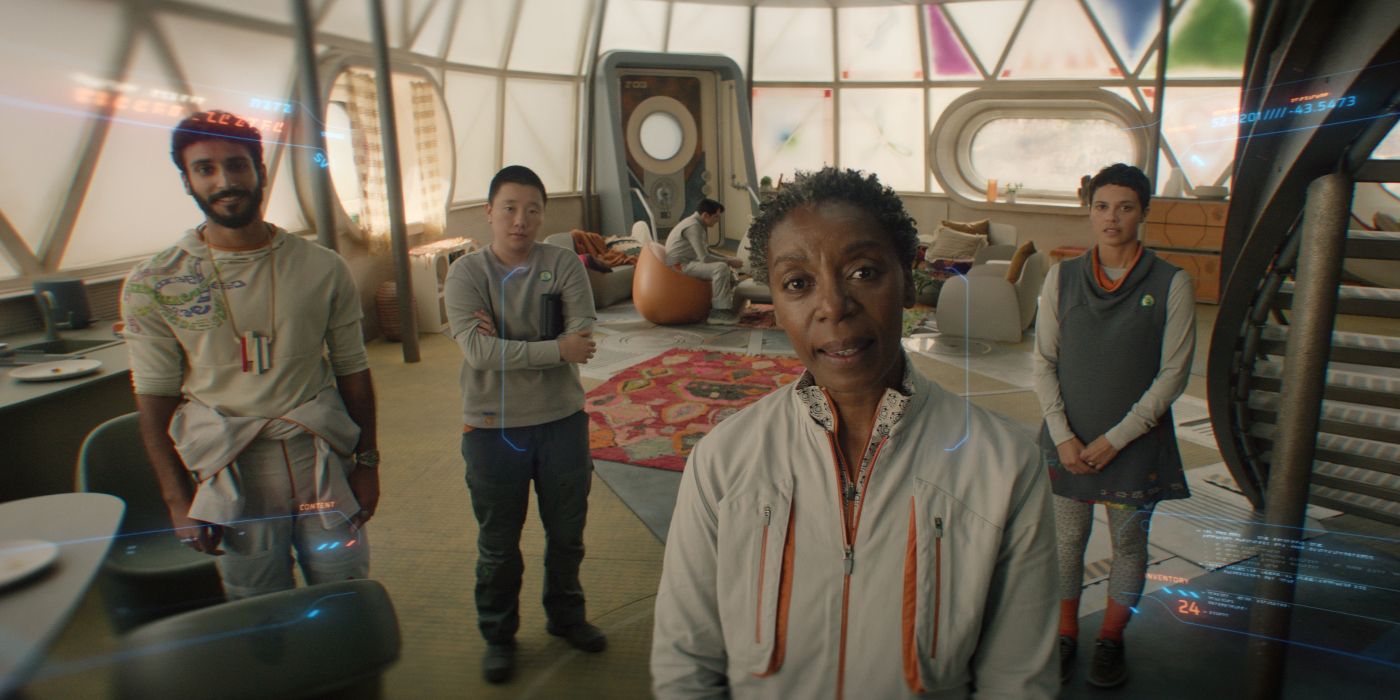Editor’s note: The below recap contains spoilers for Murderbot Episode 1.
Welcome back to one of the most exciting times of the year — the launch of a new science fiction series on Apple TV+. This streaming platform has successfully carved out a niche for itself with its impressive lineup of high-concept, high-quality genre shows, having previously produced acclaimed series like Silo, Foundation, For All Mankind, and, of course, the mind-bending Severance. Now, audiences can enjoy Murderbot, a comedy featuring Alexander Skarsgård in the role of the titular rogue robot, based on the renowned The Murderbot Diaries series by acclaimed author Martha Wells, specifically her opening novella, All Systems Red. The series has been skillfully adapted by Chris Weitz and Paul Weitz, who also take the reins for writing the premiere episode, titled “FreeCommerce,” with the latter serving as director.
A delightful blend of sci-fi technobabble, witty humor, and a tender heart, Murderbot is already launching into the cosmos for fans of Wells’ beloved series. But fret not — the Weitzs ensure that this vibrant futuristic setting remains accessible for viewers curious about Skarsgård’s comedic talent as a depressed, misanthropic, agender, autistic-coded, and media-obsessed cyborg. “FreeCommerce” bravely navigates the necessary exposition to establish the intricacies of Murderbot’s universe and the key players within it, and trust us, there are numerous moving parts — so let’s embark on this journey together.
How a Security Robot Gains Free Will in ‘Murderbot’ Episode 1
Murderbot begins with a mining team reveling in the conclusion of their six-month expedition. The celebration is filled with classic party antics, including excessive drinking and raucous shouting. Our main character, a Security Unit (or SecUnit) crafted to safeguard its clients from various hazards, opts out of the festivities. Using a dry and discontented voiceover, it shares its candid thoughts about humanity: we’re bizarre, infuriating, and, above all, complete jerks. Fortunately, the governor module embedded within each SecUnit’s framework compels them to follow any order given by their clients and prevents them from causing harm to innocent humans (think: Isaac Asimov‘s Three Laws of Robotics).
However, this particular SecUnit is not like the others. It successfully hacks and disables its governor module, liberating itself to pursue its desires. Astounded and exhilarated by its newfound freedom, the SecUnit contemplates what to do next. Should it eliminate its former clients, perhaps? Venture into the galaxy’s hidden pleasures? And what about adopting a name more intriguing than “Security Unit 238776431”? After some deliberation, it tentatively settles on “Murderbot.” Fast forward several months, and Murderbot’s first grand adventure involves… returning to work. Its sardonic narration reveals that if it genuinely attempted to escape the relentless hustle of galactic culture, there’s a significant risk the corrupt Company profiting from the creation and sale of SecUnits would track it down, eliminate its organic components, and dismantle its remaining mechanical parts for spare components. What a dull conclusion to this “free will” narrative that would be.
Murderbot’s Desire to Binge-Watch TV in Episode 1
Currently, Murderbot’s clients represent a refreshing, albeit perplexing, departure from the usual: “a bunch of hippie scientists” from the Preservation Alliance, a planetary commune that operates outside and independently of the galaxy’s largest territory, known as the Corporation Rim. Leading the group is Dr. Mensah (Noma Dumezweni), a skilled terraforming expert and mother of seven. The team also comprises Pin-Lee (Sabrina Wu), the legal advisor; Arada (Tattiawna Jones), a biologist and Pin-Lee’s spouse; wormhole specialist and amateur jewelry designer Ratthi (Akshay Khanna); geochemist and fragrant soap enthusiast Bharadwaj (Tamara Podemski); and Gurathin (David Dastmalchian), a tech specialist enhanced with neural implants that enable him to interface with electronic systems as if he were a human Bluetooth.
Any expedition within the Corporation Rim necessitates insurance. To secure such insurance, the bonding company coerces the PreservationAux envoys — who perceive cyborg “constructs” like SecUnits as a form of slavery — into leasing a SecUnit for their supposedly safe exploration. Instead of opting for the latest and priciest model, Mensah chooses Murderbot, but not before she and her colleagues share a moment of connection, briefly holding hands, closing their eyes, and humming a peaceful note of “consensus.” Murderbot can barely contain its eye-roll. This exasperation continues as Mensah’s team settles into their on-site planetary habitat. These quirky individuals genuinely enjoy each other’s company, and they don’t treat Murderbot merely as a tool or a plaything to be tormented. However, they still exhibit bizarre behaviors, possess unappealing bodies, and display chaotic emotions; it’s a lot for Murderbot to handle.
Fortunately for our disgruntled SecUnit, it discovers a source of solace: television. After gaining unrestricted access to the Company’s satellite system, which includes entertainment channels, Murderbot quickly transforms into the ultimate binge-watcher, accumulating 7,532 hours of TV viewing. Its preferred show, The Rise and Fall of Sanctuary Moon, is a long-running soap opera that Murderbot the series emulates after Star Trek: The Original Series (complete with vibrant costumes, cheesy dialogue, and guest appearances from John Cho, Clark Gregg, Jack McBrayer, and DeWanda Wise). Murderbot seamlessly juggles marathoning its favorite shows while keeping an eye on its clients, all without so much as shifting an armored muscle.
A Life-Threatening Assault Raises Alarms for ‘Murderbot’s Survey Team
Being able to split its focus proves beneficial when, right after Sanctuary Moon drops a shocking love triangle revelation, Murderbot’s sensors suddenly pick up a threat during a routine outing in a secure area. Bharadwaj and Arada, engaged in sample collection, disregard their SecUnit’s alerts. Shortly thereafter, a gigantic centipede-like creature — not quite as immense as Dune‘s sandworms, but still formidable — erupts from the ground and snatches Bharadwaj in its menacing jaws. Murderbot channels its inner action hero by sliding down a hill, guns at the ready, and rescuing Bharadwaj. Naturally, the creature simply replaces Bharadwaj with Murderbot, who finds itself swallowed whole. The solution? Murderbot’s weaponry blasts a hasty escape route through the creature’s massive body. Though injured, the beast retreats back underground.
Poor Arada is left in shock, unable to move as he attempts to stem the blood flow from a severely injured and unconscious Bharadwaj. However, time is of the essence, as the hungry predator is sure to return. Murderbot quickly adapts — for the first time, it removes its helmet to reveal its Skarsgård face. Unsure of what to say, it recites the reassuring dialogue it recently heard from Cho’s dashing and unfaithful Sanctuary Moon captain. Murderbot’s delivery is as awkward and stilted as a first-day drama camp performance, but Arada responds by accepting its offered hand.
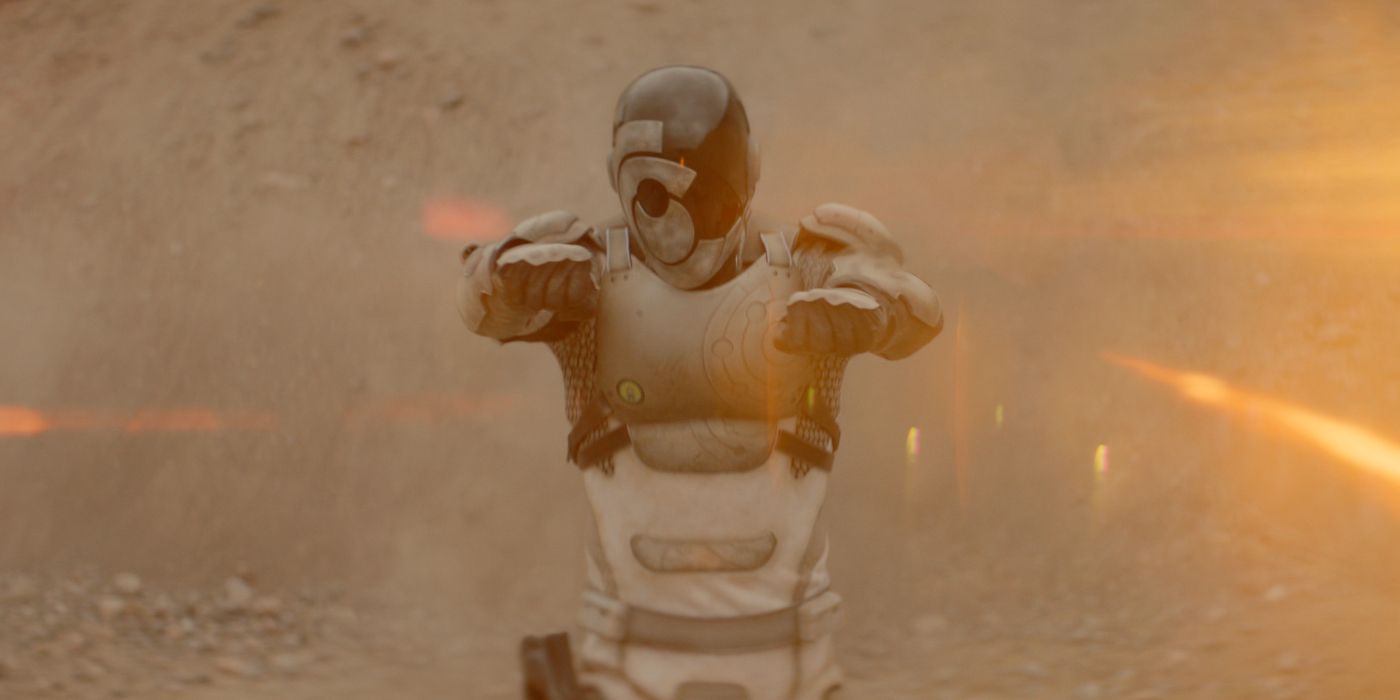
Related
Alexander Skarsgård’s Bloodthirsty New Sci-Fi Series Debuts With a Delicious Rotten Tomatoes Score
The series also stars David Dastmalchian.
After the trio reunites with the rest of the crew in their transport vehicle, Murderbot dissociates, its face turned towards a corner. It is stunned by the realization that these individuals willingly relinquished their expensive, high-tech surveying equipment to save Bharadwaj’s life. Despite their apparent non-jerk nature, however, Murderbot showing Arada its face was a foolish risk; its existence relies on its clients never discovering its, well, uniqueness. Turning its head just enough to assess them with a dramatic, criminally offensive side-eye, Murderbot contemplates the idea of eliminating them coldly. However, it concludes, “This piece-of-crap hopper couldn’t take me to another planet. So I’d be stuck here, unable to download more media.”
Upon returning to the habitat, Mensah fusses over Murderbot’s injury; its squishy insides are visibly exposed. Murderbot reassures Mensah that it remains “within operating parameters.” Concerned for its well-being rather than its performance, Mensah insists that Murderbot visit the medbay. Cut to a colleague holding the opposite view: Gurathin insists that Mensah should immediately deactivate their dangerous, malfunctioning SecUnit. It seems that the team’s only tech-enhanced human has bought into the media’s misleading portrayal of SecUnits as inherently murderous entities. Arada and Ratthi, however, object, fond of Murderbot after its heartfelt rescue and its “kind [of] sweet face.” Mensah concludes the discussion with a rational argument; even if they activated a distress signal, external assistance would take too long to arrive — and without adequate security, they would be in serious trouble.
Murderbot’s Hidden Traumatic Secret in Episode 1
As Murderbot connects to the habitat’s camera feeds, it overhears every word spoken. For the moment, it is too preoccupied with healing itself to care. As the repair tools generate new skin from scratch, viewers witness Murderbot’s complete design: a blend of inorganic and organic materials layered beneath human skin and tissue. On the exterior, it resembles a normal (if muscular) human body, minus any sexual organs. When Mensah summons Murderbot over the communications system, our protagonist spirals into the panic familiar to every introvert called to an unexpected meeting. Even worse, Murderbot’s armor — its version of a security blanket — remains damaged, forcing it to don a spare uniform.
Internally screaming, Murderbot shuffles into public view, timidly flinching and avoiding eye contact as if it were an Olympic event. Ratthi leads a round of applause to celebrate its successful efforts, half-jokingly calling for a speech that Murderbot’s systems misinterpret as a command. “What’s more dreadful,” it internally muses, “speech or an acid bath?” Eventually, it informs the team (excluding the slumbering Bharadwaj) that while the region’s maps weren’t tampered with, they aren’t syncing correctly. Mensah temporarily sets aside that irregularity and dismisses Murderbot, but not without offering it a designated space in the crew area. Murderbot’s panicked silence and ready-to-vomit expression make its preference abundantly clear.
Instead of hastening back to complete repairs, Murderbot unravels further, pausing to press its face into the corridor wall. If honest with itself, Murderbot cannot entirely deny Gurathin’s suspicions. Our socially awkward protagonist also serves as an unreliable narrator, with robotic amnesia resulting from the Company erasing its memories of everything preceding its refurbishment. All that remains is a fragmented, seven-second recollection of terrified individuals fleeing for their lives as an unidentified SecUnit guns them down. It’s deeply unsettling for Murderbot to confront the possibility that it may have unintentionally lived up to its ominous name, and by this point, we understand it despises discomfort. Unsurprisingly, M-Bot isn’t the sole character struggling to manage their stress response. Gurathin paces near Bharadwaj’s recovering body, Arada and Pin-Lee share an embrace in bed, and Mensah battles a panic attack.
During the night, Mensah drops by for an unexpected conversation while Murderbot remains in its repair cubicle. Having a client witness its naked form doesn’t even register as embarrassing compared to the torment of making eye contact. Mensah, grappling with insomnia and uncertainty, attempts to gain a clearer understanding of their peculiar protector, and Murderbot’s paranoia resurfaces with a vengeance, a distraction from even the most engaging television. Does Mensah suspect the truth? Can Murderbot genuinely ensure their safety when it might have innocently contributed to a massacre? Once Mensah departs, Murderbot echoes the same Sanctuary Moon dialogue that it recited to Arada during her moment of crisis: “Stay calm. It’ll be alright. You have my word.”
The first two episodes of Murderbot are available for streaming on Apple TV+. New episodes debut every Friday.
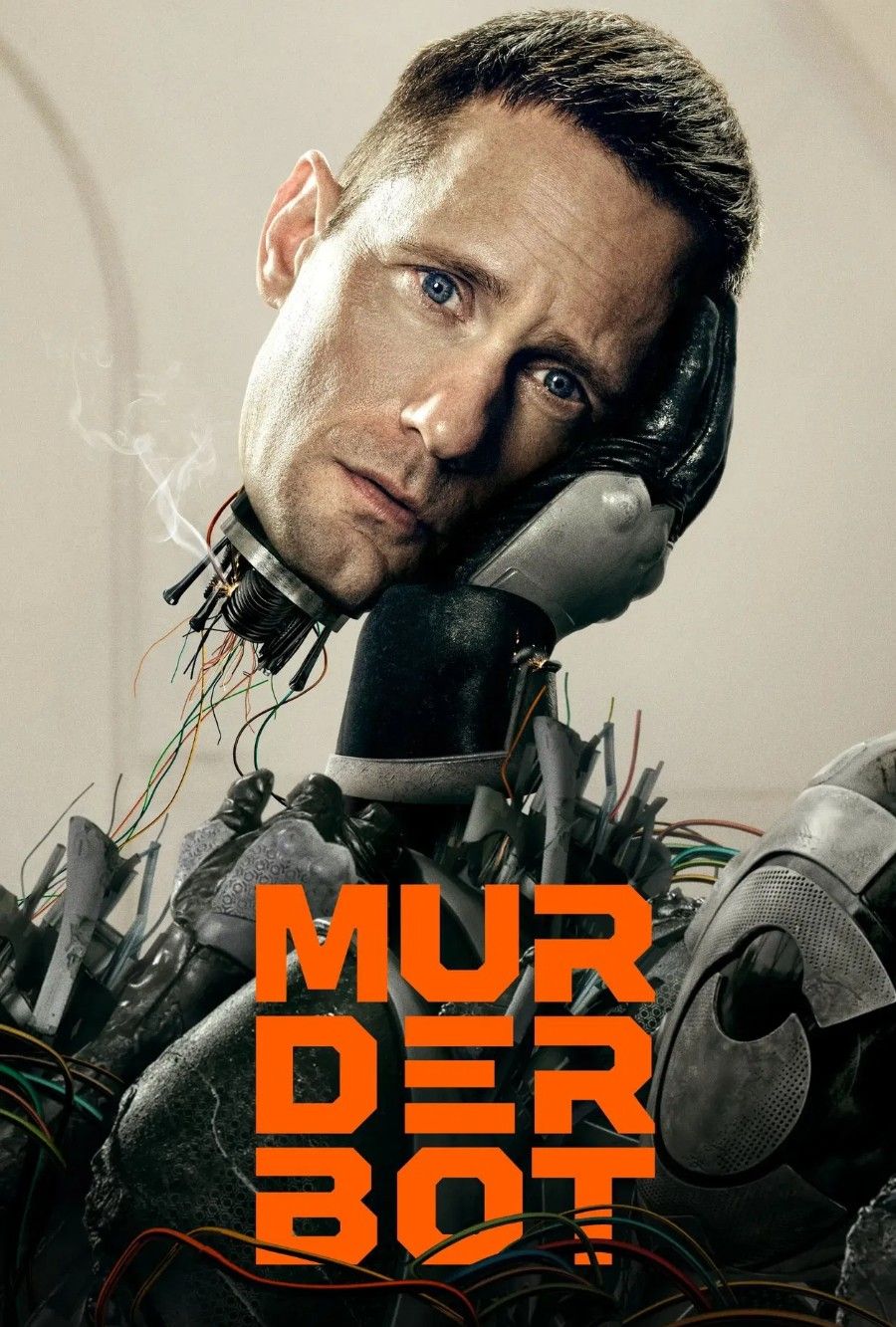
Murderbot
“FreeCommerce” introduces us to Murderbot’s world and the players within it.
- Release Date
-
May 16, 2025
- Network
-
Apple TV+
- Frontloading the most crucial exposition allows the remainder of the episode to establish both characters and plot effectively.
- Murderbot’s sardonic, candid inner monologue is absolutely delightful.
- Alexander Skarsgård’s comedic performance hits all the right notes while showcasing depth.
- The supporting cast exhibits stellar chemistry and memorable presences, particularly Noma Dumezweni and David Dastmalchian.

